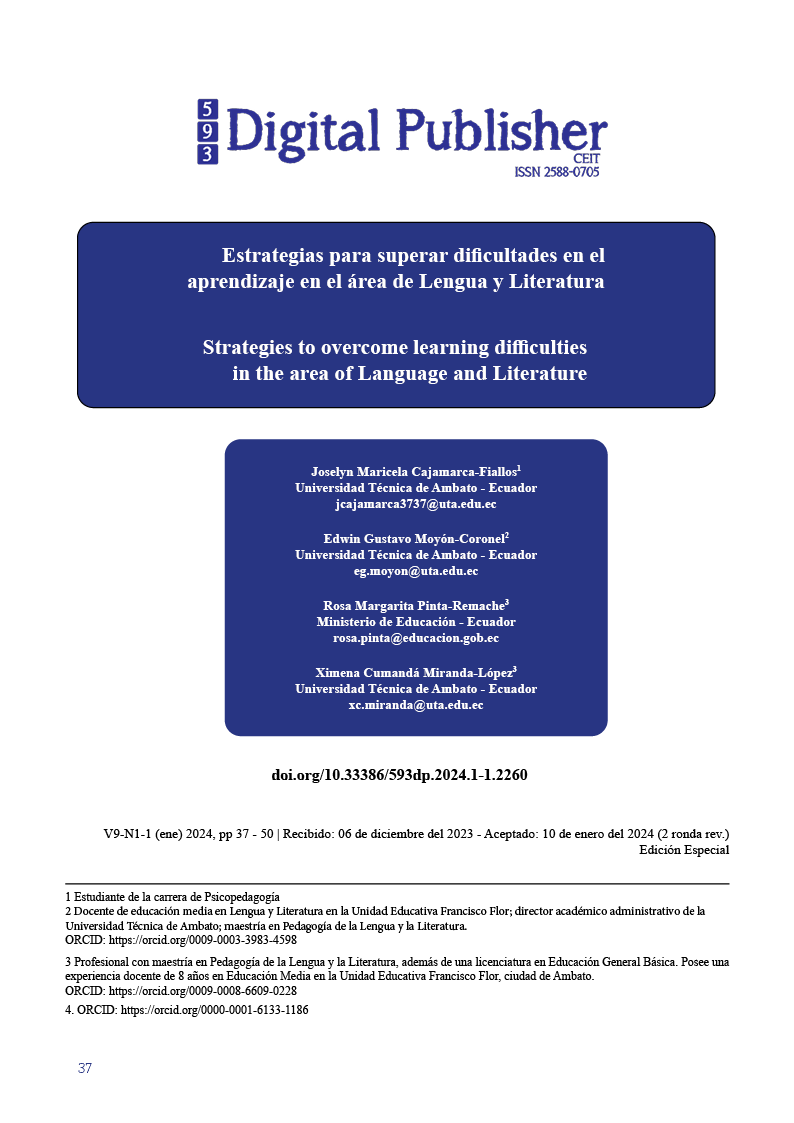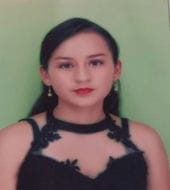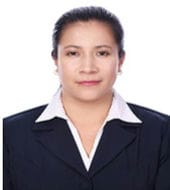Strategies to overcome learning difficulties in the area of Language and Literature
Main Article Content
Abstract
The text provided addresses the topic of "Strategies to overcome difficulties in learning in the area of Language and Literature." In which the importance of effective teaching of Language and Literature for the development of communication and comprehension skills in students is highlighted, and it can be noted that the lack of teacher training, limited educational resources, the adoption of a standardized approach and lack of early detection of difficulties can make significant challenges in teaching this area. The study is based on a qualitative and descriptive methodology, and focuses on the importance of pedagogical strategies, the development of both linguistic and literary skills, the integration of technology which maintains a fundamental role within the activities, the strategies psychopedagogical and the focus on communication skills. It is concluded that flexible pedagogical strategies adapted to the individual needs of students are essential to facilitate effective learning in Language and Literature
Downloads
Article Details

This work is licensed under a Creative Commons Attribution-NonCommercial-ShareAlike 4.0 International License.
1. Derechos de autor
Las obras que se publican en 593 Digital Publisher CEIT están sujetas a los siguientes términos:
1.1. 593 Digital Publisher CEIT, conserva los derechos patrimoniales (copyright) de las obras publicadas, favorece y permite la reutilización de las mismas bajo la licencia Licencia Creative Commons 4.0 de Reconocimiento-NoComercial-CompartirIgual 4.0, por lo cual se pueden copiar, usar, difundir, transmitir y exponer públicamente, siempre que:
1.1.a. Se cite la autoría y fuente original de su publicación (revista, editorial, URL).
1.1.b. No se usen para fines comerciales u onerosos.
1.1.c. Se mencione la existencia y especificaciones de esta licencia de uso.
References
Almedina & Rodríguez, R. S. (2020). Las competencias profesionales del orientador escolar: el rol que representa desde la visión del alumnado. Revista de Investigación Educativa, 38(1), 71-88. Obtenido de https://revistas.um.es/rie/article/view/321041
Andrews, R. (2010). La relación entre la investigación y la enseñanza en la educación superior. Google Academico. Obtenido de http://www.innovacesal.org/subred_portalredic/innova_public/app/webroot/archivos/publica/ponencias/24/archivos/Andrews_Innova-CESAL(SP).pdf
Barney G. Glaser & Strauss, A. L. (1967). The discovery of grounded theory: strategies for qualitative research. (reimpresa ed.). (T. Aldine, Ed.) Obtenido de http://www.sxf.uevora.pt/wp-content/uploads/2013/03/Glaser_1967.pdf
Beck, I. L., & McKeown, &. M. (2018). Profundizar el conocimiento a través del aprendizaje de vocabulario. American Educational Research Journal. Obtenido de https://files.eric.ed.gov/fulltext/EJ1180092.pdf
Blanco García, A. (2021). La simbiosis entre la enseñanza de la escritura creativa y la acción social a través del Aprendizaje-Servicio y la ecocrítica: innovación educativa y aplicaciones a la didáctica de lengua y literatura española y extranjera. Google academico. Obtenido de https://accedacris.ulpgc.es/handle/10553/113610
Brookhart, S., & Nitko, A. J. (2020). Assessment and Grading in Classrooms 1st Edición. Obtenido de https://www.amazon.com/-/es/Susan-M-Brookhart/dp/0132217414
Brown, D. (2014). Principios del aprendizaje y la enseñanza. dokumen.pub. Obtenido de https://dokumen.pub/principles-of-language-learning-and-teaching-6nbsped-0133041948-9780133041941.html
Castillo Guilcapi, M. J., Villacis Uvidia, C. A., & Echeverría Montalbán, M. F. (2018). Estrategias activas para potenciar el aprendizaje en el área de lenguaje. Atlante. Obtenido de https://www.eumed.net/rev/atlante/2018/03/aprendizaje-lenguaje.html
Ceballos Almeraya, J. M. (2020). La socioformación y el desarrollo de competencias investigativas: un enfoque didáctico para la investigación en estudiantes de pedagogía. Revista Internacional de Tecnología, Conocimiento y Sociedad, . Obtenido de https://research.ebsco.com/c/ra5eop/results?q=AN%20143271596
Clandinin & Connelly, F. (2000). Narrative Inquiry: Experience and Story in Qualitative Research. Copyright. Obtenido de https://books.google.com.ec/books?id=eJw3EAAAQBAJ&printsec=frontcover&hl=es&source=gbs_ViewAPI&redir_esc=y#v=onepage&q&f=false
Cromley, J. (2017). Uso de estrategias flexibles por parte de estudiantes que aprenden mucho versus poco del texto: transiciones dentro de protocolos de pensamiento en voz alta. ResearchGate. Obtenido de https://www.researchgate.net/publication/264716087_Flexible_strategy_use_by_students_who_learn_much_versus_little_from_text_Transitions_within_think-aloud_protocols
Gálvez, & Galarza, T. &. (2023). Optimizando la enseñanza en educación superior: una revisión de estrategias para la inclusión de estudiantes con necesidades educativas especiales. Revista Multidisciplinaria Arbirtrada de investigacion cientifica, Vol. 7 Núm. 3 . Obtenido de https://www.investigarmqr.com/ojs/index.php/mqr/article/view/673
García, Lara, & Zamora, &. P. (2018). “Estrategias para la evaluación formativa en el Área de Lengua y Literatura. Google Academico. Obtenido de https://www.researchgate.net/profile/Eulalia-Beatriz/publication/333934805_ESTRATEGIAS_PARA_LA_EVALUACION_FORMATIVA_EN_EL_AREA_DE_LENGUA_Y_LITERATURA_PARA_ESTUDIANTES_DE_BACHILLERATO_FORMATIVE_EVALUATION_STRATEGIES_IN_THE_LANGUAGE_AND_LITERATURE_AREA_FOR_
Gardner. (1994). Frames ofd Mind. The Theory of Multiple Inteligences. New York: Publicado por Basic Books, división de Harper Collins Publisher Inc., Nueva York. Obtenido de http://biblioteca.udgvirtual.udg.mx/jspui/bitstream/123456789/593/1/Estructura%20de%20la%20mente.%20teoria%20de%20las%20Inteligencias%20multiples.pdf
Guamán Galora, E. D. (2022). Recursos tecnológicos colaborativos en el proceso de enseñanza aprendizaje, en el área de Lengua y Literatura (Bachelor’s thesis, Ecuador. Google academico. Obtenido de https://repositorio.utc.edu.ec/handle/27000/9518
Gutiérrez, G. (2019). Comillas.edu. Obtenido de https://repositorio.comillas.edu/rest/bitstreams/239024/retrieve
Juárez Mendoza, R. I., & Medina Martínez, E. M. (2014). Tècnicas metodológicas para contribuir a la mejora del rendimiento académico en el proceso enseñanza aprendizaje en el área de Lengua y Literatura. Google academico. Obtenido de http://riul.unanleon.edu.ni:8080/jspui/bitstream/123456789/4330/1/228686.pdf
Kilpatrick. (2015). Fundamentos para evaluar, prevenir y superar las dificultades lectoras . Obtenido de https://books.google.es/books?hl=es&lr=&id=D_jzBgAAQBAJ&oi=fnd&pg=PR15&dq=En+2003,+David+Kilpatrick,+en+su+libro+%22Essentials+of+Assessing,+Preventing,+and+Overcoming+Reading+Difficulties%22,+resalt%C3%B3+la+importancia+de+identificar+y+comprender+las+di
Madrid Fernández, D. (2014). La formación inicial del profesorado de lengua . Profesorado. Redalyc. Obtenido de https://www.ugr.es/~recfpro/rev81ART7.pdf
Mallinson, C., & Charity Hudley, A. (2014). Asociarse a través de la ciencia: desarrollar una visión lingüística para abordar la desigualdad educativa para estudiantes cultural y lingüísticamente diversos en la educación. Google Academico. Obtenido de https://compass.onlinelibrary.wiley.com/doi/abs/10.1111/lnc3.12060
Marzano, R. J. (2017). The new art and science of teaching. Google Academico. Obtenido de https://cloudfront-s3.solutiontree.com/pdf/study_guides/NAST_study_guide.pdf
Montealegre&Forero. (2006). Desarrollo de la lectoescritura: adquisición y dominio. Redalyc. Obtenido de https://www.redalyc.org/pdf/798/79890103.pdf
Moore, J. (2020). Liderazgo culturalmente relevante en la educación para superdotados: una revisión sistemática de la literatura. Liderazgo culturalmente relevante en la educación para superdotados: una revisión sistemática de la literatura. Revista para la Educación de los Superdotados. Obtenido de https://journals.sagepub.com/doi/abs/10.1177/0162353220912009
Murray, D. (2003). Writing for your Readers (Notes on the Writer´s Craft from the Boston Globe). The Globe Pequot Press. Obtenido de file:///C:/Users/spc/Downloads/37534-Article%20Text-104809-1-10-20190510.pdf
Pearson, D. (2009). Las raíces de la enseñanza de la comprensión lectora. Academia. Obtenido de https://www.academia.edu/36423479/The_Roots_of_Reading_Comprehension_Instruction
Perez, J. (2019). Fundamentos de estrategia. (S. 2. Editorial Elearning, Ed.) Obtenido de https://books.google.es/books?hl=es&lr=&id=W3blDwAAQBAJ&oi=fnd&pg=PA7&dq=Seg%C3%BAn+P%C3%A9rez+(2019),+el+diagn%C3%B3stico+preciso+de+las+dificultades+individuales+es+esencial+para+adaptar+las+estrategias+de+apoyo+de+manera+efectiva.&ots=BTDhxV0zpX&sig=gw
Sadiku, L. (2015). La importancia de cuatro habilidades: leer, hablar, escribir y escuchar en una hora de lección. Revista Europea de Lengua y Literatura . Obtenido de https://revistia.org/files/articles/ejls_v1_i1_15/Lorena_Manaj.pdf
Salvatierra Mise, L. E. (2022). Estrategia didáctica de comprensión lectora en la enseñanza–aprendizaje de Lengua y Literatura. Google academico. Obtenido de https://repositorio.unesum.edu.ec/handle/53000/4024
Solé, I. (2012). La comprensió lectora. Debats Education. Obtenido de https://xtec.gencat.cat/web/.content/alfresco/d/d/workspace/SpacesStore/0079/bd4b84d2-cf8d-44c5-8514-aa32188085df/conferencia-Isabel-Sole.pdf
Suárez-Lantarón, B. &.-M. (2022). Grupos interactivos y su influencia en el rendimiento académico en el aula de primaria: estudio de caso. Innova Educación. Obtenido de https://www.revistainnovaeducacion.com/index.php/rie/article/view/448
Sumba Portilla, A. M. (2016). Dificultades en el aprendizaje de Lengua y Literatura. Obtenido de https://dspace.ups.edu.ec/bitstream/123456789/12682/1/UPS-CT006507.pdf
Tomlinson, C. A., & Moon, T. R. (2015). Assessment and Student Success in a Differentiated Classroom. amazon. Obtenido de https://www.amazon.com/-/es/Carol-Ann-Tomlinson/dp/1416616179
Touriñán Lopez, J. (2022). Construyendo educación de calidad desde la pedagogía. Redalyc. Obtenido de https://www.redalyc.org/journal/4418/441869722001/
Vásquez Rodríguez, F. (2010). clacso.edu.ar. Obtenido de https://biblioteca.clacso.edu.ar/Colombia/fce-unisalle/20170117011106/Estrategias.pdf
Vera, C. &. (2022). Estrategías psicopedagógicas para el desarrollo de autonomía en el aprendizaje. Google academico. Obtenido de https://repositorio.upse.edu.ec/handle/46000/9998
Vygotski, L. (1978). El desarrollo de los procesos psicológicos superiores. (Vol. Primera Edicion 1978). Grupo Editorial Grijalbo. Obtenido de https://www.terras.edu.ar/biblioteca/6/TA_Vygotzky_Unidad_1.pdf





